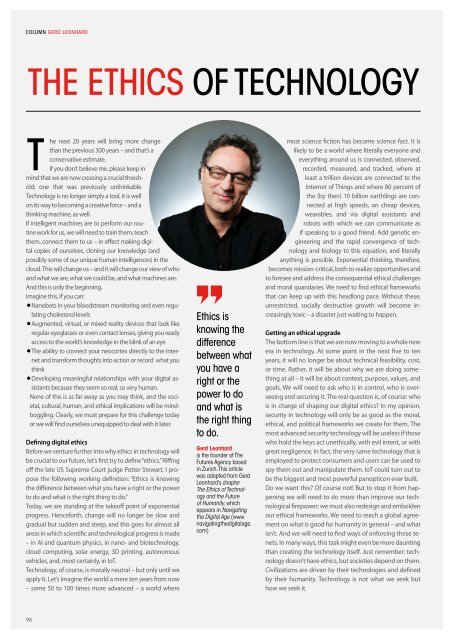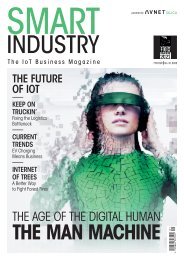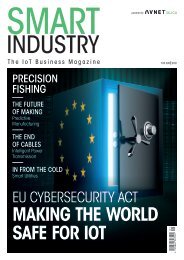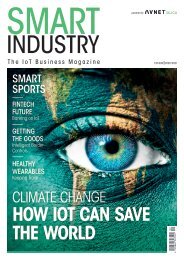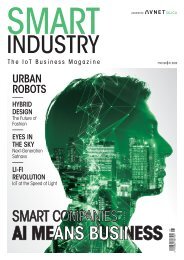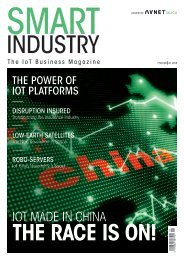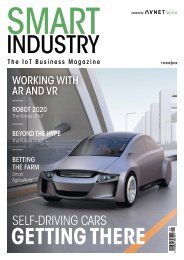Smart Industry 2/2018
Smart Industry 2/2018 - The IoT Business Magazine - powered by Avnet Silica
Smart Industry 2/2018 - The IoT Business Magazine - powered by Avnet Silica
You also want an ePaper? Increase the reach of your titles
YUMPU automatically turns print PDFs into web optimized ePapers that Google loves.
Column Gerd Leonhard<br />
The Ethics of Technology<br />
The next 20 years will bring more change<br />
than the previous 300 years – and that’s a<br />
conservative estimate.<br />
If you don’t believe me, please keep in<br />
mind that we are now crossing a crucial threshold;<br />
one that was previously unthinkable.<br />
Technology is no longer simply a tool, it is well<br />
on its way to becoming a creative force – and a<br />
thinking machine, as well.<br />
If intelligent machines are to perform our routine<br />
work for us, we will need to train them, teach<br />
them, connect them to us – in effect making digital<br />
copies of ourselves, cloning our knowledge (and<br />
possibly some of our unique human intelligences) in the<br />
cloud. This will change us – and it will change our view of who<br />
and what we are, what we could be, and what machines are.<br />
And this is only the beginning.<br />
Imagine this, if you can:<br />
• Nanobots in your bloodstream monitoring and even regulating<br />
cholesterol levels<br />
• Augmented, virtual, or mixed reality devices that look like<br />
regular eyeglasses or even contact lenses, giving you ready<br />
access to the world’s knowledge in the blink of an eye<br />
• The ability to connect your neocortex directly to the Internet<br />
and transform thoughts into action or record what you<br />
think<br />
• Developing meaningful relationships with your digital assistants<br />
because they seem so real, so very human.<br />
None of this is as far away as you may think, and the societal,<br />
cultural, human, and ethical implications will be mindboggling.<br />
Clearly, we must prepare for this challenge today<br />
or we will find ourselves unequipped to deal with it later.<br />
Defining digital ethics<br />
Before we venture further into why ethics in technology will<br />
be crucial to our future, let’s first try to define “ethics.” Riffing<br />
off the late US Supreme Court judge Potter Stewart, I propose<br />
the following working definition: “Ethics is knowing<br />
the difference between what you have a right or the power<br />
to do and what is the right thing to do.”<br />
Today, we are standing at the takeoff point of exponential<br />
progress. Henceforth, change will no longer be slow and<br />
gradual but sudden and steep, and this goes for almost all<br />
areas in which scientific and technological progress is made<br />
– in AI and quantum physics, in nano- and biotechnology,<br />
cloud computing, solar energy, 3D printing, autonomous<br />
vehicles, and, most certainly, in IoT.<br />
Technology, of course, is morally neutral – but only until we<br />
apply it. Let’s imagine the world a mere ten years from now<br />
– some 50 to 100 times more advanced – a world where<br />
Ethics is<br />
knowing the<br />
difference<br />
between what<br />
you have a<br />
right or the<br />
power to do<br />
and what is<br />
the right thing<br />
to do.<br />
Gerd Leonhard<br />
is the founder of The<br />
Futures Agency based<br />
in Zurich. This article<br />
was adapted from Gerd<br />
Leonhard’s chapter<br />
The Ethics of Technology<br />
and the Future<br />
of Humanity, which<br />
appears in Navigating<br />
the Digital Age (www.<br />
navigatingthedigitalage.<br />
com)<br />
most science fiction has become science fact. It is<br />
likely to be a world where literally everyone and<br />
everything around us is connected, observed,<br />
recorded, measured, and tracked, where at<br />
least a trillion devices are connected to the<br />
Internet of Things and where 80 percent of<br />
the (by then) 10 billion earthlings are connected<br />
at high speeds, on cheap devices,<br />
wearables, and via digital assistants and<br />
robots with which we can communicate as<br />
if speaking to a good friend. Add genetic engineering<br />
and the rapid convergence of technology<br />
and biology to this equation, and literally<br />
anything is possible. Exponential thinking, therefore,<br />
becomes mission-critical, both to realize opportunities and<br />
to foresee and address the consequential ethical challenges<br />
and moral quandaries. We need to find ethical frameworks<br />
that can keep up with this headlong pace. Without these,<br />
unrestricted, socially destructive growth will become increasingly<br />
toxic – a disaster just waiting to happen.<br />
Getting an ethical upgrade<br />
The bottom line is that we are now moving to a whole new<br />
era in technology. At some point in the next five to ten<br />
years, it will no longer be about technical feasibility, cost,<br />
or time. Rather, it will be about why we are doing something<br />
at all – it will be about context, purpose, values, and<br />
goals. We will need to ask who is in control, who is overseeing<br />
and securing it. The real question is, of course: who<br />
is in charge of shaping our digital ethics? In my opinion,<br />
security in technology will only be as good as the moral,<br />
ethical, and political frameworks we create for them. The<br />
most advanced security technology will be useless if those<br />
who hold the keys act unethically, with evil intent, or with<br />
great negligence. In fact, the very same technology that is<br />
employed to protect consumers and users can be used to<br />
spy them out and manipulate them. IoT could turn out to<br />
be the biggest and most powerful panopticon ever built.<br />
Do we want this? Of course not! But to stop it from happening<br />
we will need to do more than improve our technological<br />
firepower; we must also redesign and embolden<br />
our ethical frameworks. We need to reach a global agreement<br />
on what is good for humanity in general – and what<br />
isn’t. And we will need to find ways of enforcing these tenets.<br />
In many ways, this task might even be more daunting<br />
than creating the technology itself. Just remember: technology<br />
doesn’t have ethics, but societies depend on them.<br />
Civilizations are driven by their technologies and defined<br />
by their humanity. Technology is not what we seek but<br />
how we seek it.<br />
98


